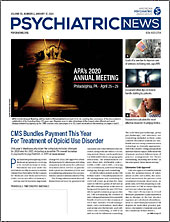Climate change, practice guidelines, changes to DSM, and the future of APA’s annual fall meeting were among the many items of business considered at last month’s meeting of the APA Board of Trustees in Washington, D.C.
Trustees approved a practice guideline on the treatment of patients with schizophrenia to align with the recommendations of the National Academy of Medicine (formerly the Institute of Medicine) for trustworthy clinical practice guidelines. The guideline work group was chaired by George Keepers, M.D.
A draft of the guideline was available for comment from May 13 to June 28, 2019. Multiple comments were received from Assembly members, several APA councils and allied organizations, APA members, and the public.
Trustees also approved several changes to DSM recommended by the DSM Steering Committee. These included reinstatement of unspecified mood disorder, changes to the specifiers for narcolepsy subtypes, changes to the criteria and “diagnostic features” text for avoidant/restrictive food intake disorder (ARFID), and changes to the criteria for substance/medication-induced disorders.
Speaking by conference phone, Steering Committee Chair and past APA President Paul Appelbaum, M.D., noted that APA has established a process to update DSM as warranted by new scientific evidence or the identification of errors in the existing text.
Trustees voted to refer to the Board’s Executive Committee an action paper, approved by the Assembly last November, calling on the Association to add its name to the list of signatories to the “Call to Action on Climate, Health, and Equity.” The Board directed relevant APA components and the administration to review the document first and present its comments to the Executive Committee before its scheduled February 18 conference call.
The “Call to Action,” endorsed by more than 100 organizations including the AMA and other medical groups, urges government, business, civil society leaders, elected officials, and candidates for office to recognize climate change as a health emergency (
Psychiatric News).
APA President Bruce Schwartz, M.D., discussed a new initiative he launched on “interprofessional collaboration” involving a number of mental health disciplines to help address the crisis regarding access to treatment for people with serious mental illness.
Schwartz said that treatment for such patients requires a team. “At my hospital, I can call on a CBT specialist, a social worker, and people in other disciplines. Psychiatrists working in the community can’t necessarily do that. We need to look past our differences and see which skills each discipline brings to the table.”
Sandra DeJong, M.D., APA secretary and chair of the Task Force on Interprofessional Collaboration, reported on the first meeting of the task force. Representatives of 10 organizations are joining APA in this initiative: American Academy of Physician Assistants, American Mental Health Counselors Association, Association for Behavioral and Cognitive Therapies, American Psychological Association, College of Psychiatric and Neurologic Pharmacists, International Association of Peer Supporters, National Alliance on Mental Illness, National Association of Social Workers, American Association of Nurse Practitioners, and American Psychiatric Nurse Practitioners Association.
Trustees approved a resolution from the Joint Reference Committee (JRC) that the Chester M. Pierce Human Rights Award be given to an individual in odd years and to an organization in even years. For 2020, they approved Global Press Institute to receive the award. In a September 2019 letter, James Griffith, M.D., chair of the Chester M. Pierce Human Rights Award Selection Committee, said the institute was nominated “based on its pioneering contributions to the empowerment of local women in low-income countries and their raising industry standards for ethical, accurate journalism as an instrument of social change.” (The website for GPI is
www.globalpressinstitute.org)
Trustees also accepted a recommendation from the JRC to change the Psychiatric Services Achievement Awards from two Gold Awards to one Gold Award. They also voted to create a work group to look more broadly at APA’s award processes.
The Board approved the following nominations for APA awards:
•
Sen. Gayle Harrell (D-Fla.) for the 2020 Jacob K. Javits Public Service Award
•
Jeffrey Lyness, M.D., for the 2020 Vestermark Psychiatry Educator Award
•
Johnathan Metzl, M.D., Ph.D., for the 2020 Benjamin Rush Award
•
Kimberly Yonkers, M.D., for the 2020 Adolf Meyer Award
•
E. Fuller Torrey, M.D., for the 2020 Patient Advocacy Award
•
Francis G. Lu, M.D., Ellen Bergman, M.D., and Miriam B. Rosenthal, M.D., for 2020 Distinguished Service Awards
•
The New York State Office of Mental Health for the 2020 Organization Distinguished Service Award
Trustees heard a report from Jacqueline Feldman, M.D., on the future of IPS: The Mental Health Services Conference, APA’s annual fall meeting. The Board accepted the report and is expected to give consideration to the future of the IPS at its meeting in March.
Finally, the Board voted to approve the retirement of the “Consensus Statement on Improving the Quality of Mental Health Care in U.S. Nursing Homes” and voted to have the Council on Quality Care, with input from the Council on Geriatric Psychiatry and the Council on Addiction Psychiatry, develop a position statement on the quality of mental health care in nursing homes.
The Board approved new position statements on the following topics: controlling drug prices, care of medically vulnerable migrants in the United States, diversity and inclusion in the physician workforce, addressing racial and ethnic health disparities in substance use disorder treatment in the justice system, mental health of foreign nationals on temporary protected status, disaster preparedness and response for older Americans, transitional-aged youth, and prescription drug monitoring programs. ■
The schizophrenia practice guideline is posted
here. APA position statements can be accessed
here. APA members can access archived summaries of Board actions at
here.



